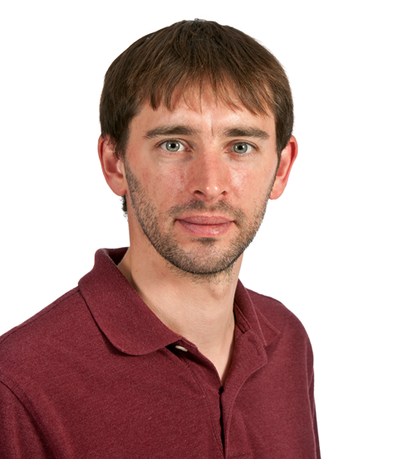Tom Sizmur
ECG Bulletin January 2016
ECG committee member Tom Sizmur is a Lecturer in Environmental Chemistry at the University of Reading. He tells us about his career as a soil chemist.
ECG committee member Tom Sizmur is a Lecturer in Environmental Chemistry at the University of Reading. He tells us about his career as a soil chemist.
|
What inspired you to become a scientist?
I have always been interested in how nature works. The natural world is fabulously complicated and there are so many interacting factors that govern the functioning of environmental systems. As a scientist, I strive to understand these factors so that we can predict future changes to our environment. How did you come to specialise in soil chemistry? During my undergraduate degree, I became interested in how soils worked and how they are affected by environmental pollutants. I still find it amazing that, as a scientific community, we seem to know more about the stars in the sky than we do about the biogeochemical interactions that occur in the soil beneath our feet. I recognised early on that there was an urgent need to better understand how soils deliver nutrients to plants and how they are able to filter or degrade pollutants. I have dedicated my professional life to understanding how organisms interact with the chemical and physical constituents in the soil. This knowledge will help to understand how they are able to support life above ground. |
Could you describe your current job?
I spend roughly half of my time teaching BSc and MSc students the fundamental concepts that underpin environmental chemistry and environmental pollution. I also teach in the field so students can explore environmental issues beyond the laboratory and practise collecting and analysing samples. The idea is to help them develop the skills they will need to become environmental consultants, regulators and research scientists when they graduate. The other half of my time is spent on research into how organisms interact with their chemical and physical environment. In much of this research I have focused on how earthworms engineer the soil environment in which they live. Earthworms create burrows and deposit casts on the soil surface. These processes change the biogeochemistry of the soil. During my PhD, I showed that the mobility of metals in soil increases after passage through the earthworm gut.
What advice would you give to anyone considering a career in environmental chemistry?
Don’t focus on trying to solve a particular environmental issue or answer a specific question that is close to your heart. The likelihood is that as your career develops, new and interesting challenges will emerge. For example, when I was a BSc student climate change was top of the agenda. Now, issues surrounding sustainable intensification of food supply are receiving a lot of attention. The skills required to address both issues are similar, because they are both complex interdisciplinary environmental issues. The key to success is to develop a set of capabilities that can be applied to whatever the next big challenge is.
What are some of the challenges facing the environmental chemistry community?
Translating research into practical solutions to environmental issues is a big challenge. For many years, environmental scientists have established a reputation for identifying problems rather than developing solutions. This has resulted in disengagement with industry. We now need to work together to develop solutions to environmental issues.
What is the most rewarding aspect of your career so far?
I still get a buzz when seeing scientific data for the first time. I often cannot wait to plot it on a graph to see if it supports the hypotheses we are testing. There is nothing more rewarding than making a discovery and, for a moment, being the only person in the world who knows it.
If you weren’t a scientist what would you do?
Since becoming a lecturer, I have discovered a passion for teaching. It is very fulfilling to mentor students in their learning. If I had not become a scientist, then I hope I would have considered a career in teaching.
I spend roughly half of my time teaching BSc and MSc students the fundamental concepts that underpin environmental chemistry and environmental pollution. I also teach in the field so students can explore environmental issues beyond the laboratory and practise collecting and analysing samples. The idea is to help them develop the skills they will need to become environmental consultants, regulators and research scientists when they graduate. The other half of my time is spent on research into how organisms interact with their chemical and physical environment. In much of this research I have focused on how earthworms engineer the soil environment in which they live. Earthworms create burrows and deposit casts on the soil surface. These processes change the biogeochemistry of the soil. During my PhD, I showed that the mobility of metals in soil increases after passage through the earthworm gut.
What advice would you give to anyone considering a career in environmental chemistry?
Don’t focus on trying to solve a particular environmental issue or answer a specific question that is close to your heart. The likelihood is that as your career develops, new and interesting challenges will emerge. For example, when I was a BSc student climate change was top of the agenda. Now, issues surrounding sustainable intensification of food supply are receiving a lot of attention. The skills required to address both issues are similar, because they are both complex interdisciplinary environmental issues. The key to success is to develop a set of capabilities that can be applied to whatever the next big challenge is.
What are some of the challenges facing the environmental chemistry community?
Translating research into practical solutions to environmental issues is a big challenge. For many years, environmental scientists have established a reputation for identifying problems rather than developing solutions. This has resulted in disengagement with industry. We now need to work together to develop solutions to environmental issues.
What is the most rewarding aspect of your career so far?
I still get a buzz when seeing scientific data for the first time. I often cannot wait to plot it on a graph to see if it supports the hypotheses we are testing. There is nothing more rewarding than making a discovery and, for a moment, being the only person in the world who knows it.
If you weren’t a scientist what would you do?
Since becoming a lecturer, I have discovered a passion for teaching. It is very fulfilling to mentor students in their learning. If I had not become a scientist, then I hope I would have considered a career in teaching.


